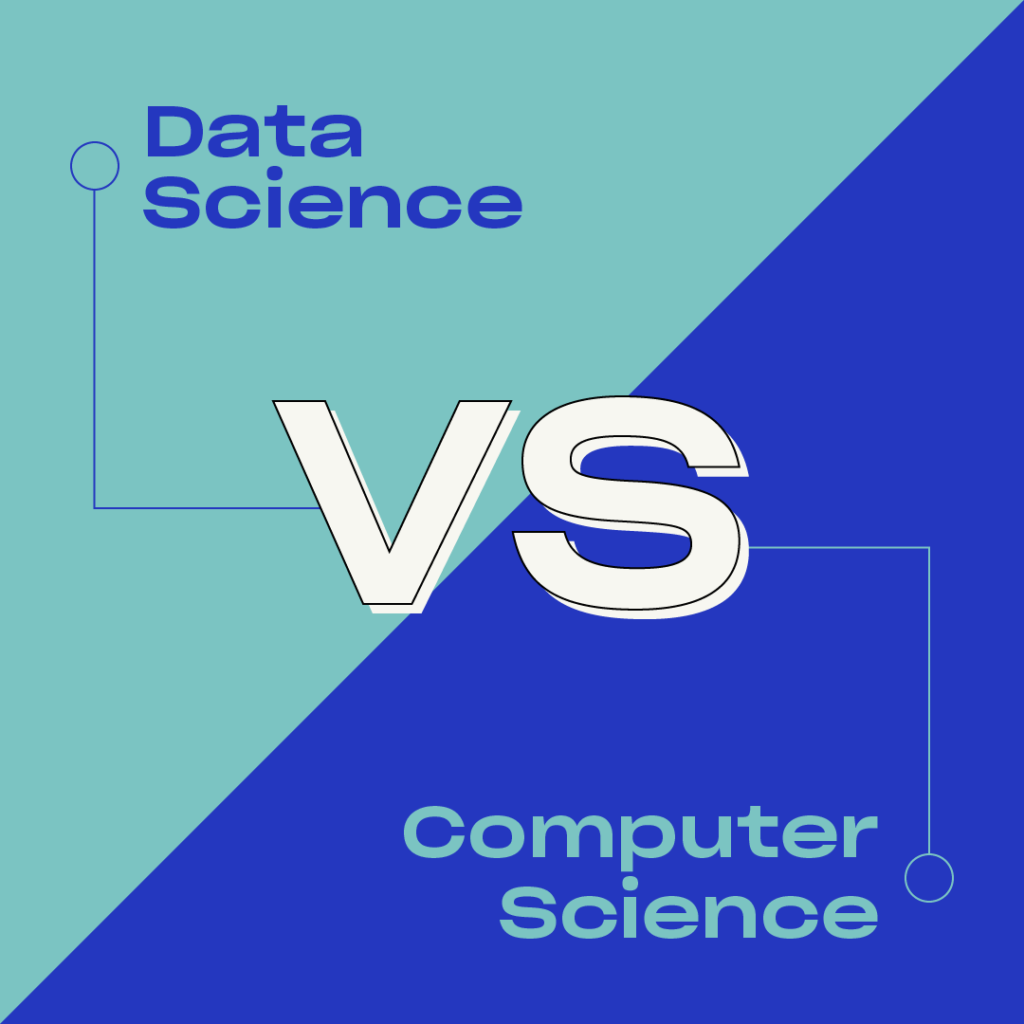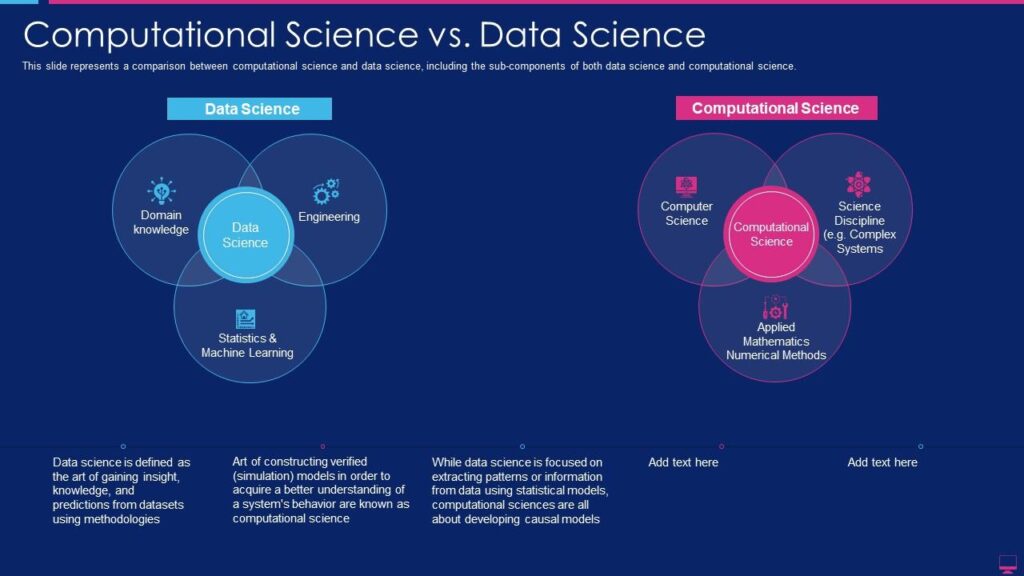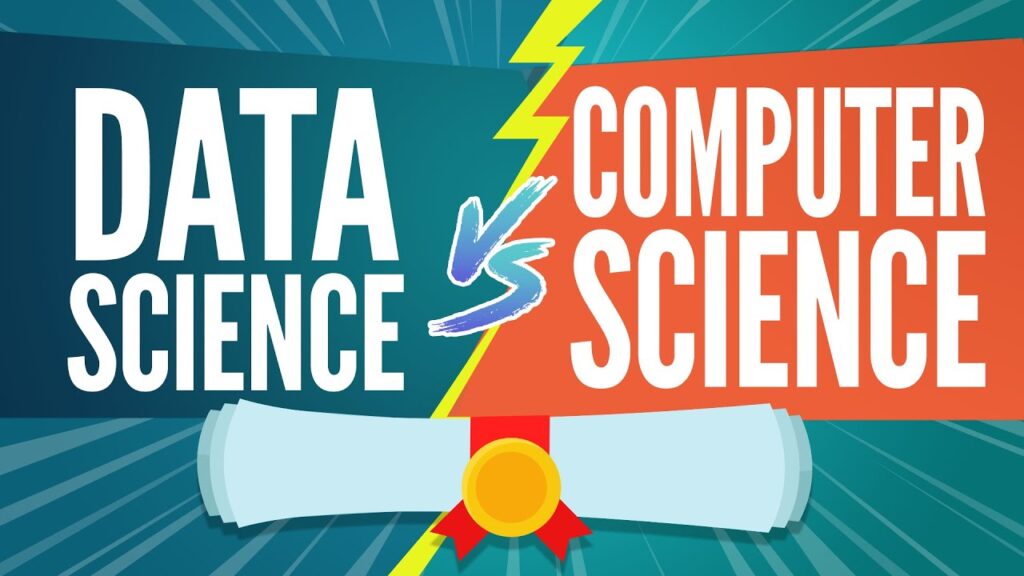Computer Science primarily deals with the study of algorithms, data structures, programming languages, and the theoretical foundations of computing. It encompasses a wide range of topics including software engineering, computer architecture, artificial intelligence, and more. Computer scientists are typically involved in designing and building software systems, developing new algorithms, and solving complex computational problems.
Data Science, on the other hand, is a multidisciplinary field that combines elements of computer science, statistics, and domain knowledge to extract insights and knowledge from data. Data scientists analyze large volumes of data to uncover patterns, trends, and correlations that can be used to make informed decisions and predictions. They often work with big data technologies, machine learning algorithms, and statistical techniques to extract valuable information from data.
Computer Science

Computer science is a multifaceted discipline that encompasses the theoretical foundations and practical applications of computing. At its core, computer science delves into the study of algorithms, data structures, programming languages, and computational theory.
This field equips individuals with the knowledge and skills to design, develop, and optimize software systems, computational algorithms, and computing infrastructure.
Key Aspects of Computer Science
Computer scientists are adept at designing and developing software solutions, ranging from web applications to embedded systems. They leverage programming languages, software development methodologies, and design principles to create efficient, scalable, and maintainable software products.
Understanding algorithms and data structures is fundamental to solving complex computational problems efficiently. Computer scientists analyze algorithmic complexity, optimize algorithms, and implement data structures to manipulate and organize data effectively.
Computer scientists study the design and implementation of operating systems, computer architectures, and hardware-software interactions. This includes memory management, process scheduling, and system-level optimization to enhance the performance and reliability of computing systems.
The field of artificial intelligence (AI) and machine learning (ML) lies at the intersection of computer science and data science. Computer scientists develop AI algorithms, neural networks, and reinforcement learning techniques to enable machines to learn from data, make decisions, and perform tasks autonomously.
Protecting data, systems, and networks from cyber threats is paramount in computer science. Computer scientists design secure communication protocols, cryptographic algorithms, and intrusion detection systems to safeguard digital assets and ensure the integrity and confidentiality of information.
Data Science

In the age of information, data reigns supreme. Data science is the discipline that seeks to extract meaning, insights, and knowledge from the vast sea of data that surrounds us.
Drawing upon techniques from mathematics, statistics, and computer science, data scientists wield powerful tools to uncover hidden patterns, predict future trends, and drive data-driven decision-making.
Key Aspects of Data Science
The journey of data science begins with the acquisition and cleaning of raw data. Data scientists wrangle with messy datasets, cleaning, transforming, and preprocessing them to extract valuable insights. From scraping web pages to integrating disparate data sources, the quest for clean, reliable data is a foundational step.
With clean data in hand, data scientists embark on the journey of exploratory data analysis (EDA). Armed with statistical techniques and visualization tools, they delve into the depths of the data, uncovering hidden patterns, correlations, and outliers that illuminate the underlying structure of the data.
At the heart of data science lies the art of statistical modeling and machine learning. Data scientists employ a diverse array of techniques, from linear regression to deep learning, to build models that capture the complex relationships within the data. Whether predicting customer churn or classifying images, the goal is to extract actionable insights from data.
A picture is worth a thousand words, and in data science, visualization is key. Data scientists leverage the power of graphs, charts, and interactive dashboards to communicate complex insights in a clear and compelling manner. Whether presenting findings to stakeholders or sharing insights with colleagues, effective visualization is essential.
In the world of data science, context is king. Data scientists collaborate closely with domain experts to understand the intricacies of the data and its real-world implications. Whether analyzing medical records or financial transactions, domain expertise is essential for interpreting results and deriving actionable insights.
Comparison and Collaboration

While computer science and data science are distinct disciplines with unique focuses and methodologies, their synergy and collaboration yield profound insights and advancements in the technological landscape.
Foundational Knowledge and Tools
Computer science provides the foundational knowledge and tools essential for data science. Concepts such as algorithms, data structures, and programming languages form the backbone of data analysis and modeling.
Data science leverages computational techniques and methodologies from computer science to process, analyze, and derive insights from large datasets. Techniques such as parallel computing, distributed systems, and optimization algorithms enhance the scalability and efficiency of data analysis.
Analytical Techniques and Methodologies
Computer science focuses on algorithmic design, complexity analysis, and optimization techniques to solve computational problems efficiently. These techniques are essential for processing and manipulating data in data science tasks.
Data science relies on statistical techniques, machine learning algorithms, and data mining methodologies to uncover patterns, trends, and correlations within data. Computer scientists contribute to the development and optimization of these techniques to enhance their effectiveness and scalability.
Interdisciplinary Collaboration
Collaboration between computer scientists and data scientists is commonplace in interdisciplinary projects that require expertise from both fields. For example, developing intelligent systems for autonomous vehicles involves integrating computer vision algorithms developed by computer scientists with machine learning models developed by data scientists to enable real-time decision-making.
Interdisciplinary collaboration fosters innovation and cross-pollination of ideas, leading to the development of novel solutions to complex problems.
By combining expertise from multiple domains, teams can tackle challenges from diverse perspectives and uncover insights that may be overlooked in isolation.
Domain Expertise Integration
Computer scientists and data scientists collaborate with domain experts to contextualize data analysis and derive actionable insights relevant to specific domains.
For example, in healthcare, computer scientists work with medical professionals to analyze patient data and develop predictive models for disease diagnosis and treatment planning.
Domain expertise integration ensures that data-driven solutions are aligned with real-world needs and constraints. By incorporating domain knowledge into the analysis process, teams can generate insights that are meaningful, interpretable, and actionable within specific domains.
Ethical and Societal Implications
Collaboration between computer scientists and data scientists extends beyond technical considerations to address ethical and societal implications of data-driven technologies. For example, teams may collaborate to develop algorithms that mitigate bias and discrimination in decision-making systems.
Ethical considerations such as data privacy, fairness, transparency, and accountability are paramount in interdisciplinary projects. By fostering open communication and collaboration, teams can navigate ethical challenges and develop responsible data-driven solutions that benefit society as a whole.
FAQs
Which is better, CSE or AI and data science?
It depends on what you like. CSE covers a lot about computers, while AI and data science focus on special computer stuff.
Can a CS student do data science?
Yep! CS students usually know a lot about computers, which helps with data science. They might need to learn more about stats and machine learning.
Is AI harder than computer science?
AI is part of computer science. Some parts, like deep learning, can be tough because they need lots of math and big data.
Is data science in demand?
Yes! Lots of businesses need data scientists to help them use data to make decisions and do better than their competitors.
Who earns more, AI or data science?
Both can pay well. It depends on things like where you work and how much experience you have. Sometimes AI jobs pay more because they’re really high-tech.
Final Words
The fields of computer science and data science are related but separate fields that are essential to the development of technology. Data science is the study of gaining information and insights from data, whereas computer science is more concerned with computing, algorithms, and software development.
For prospective individuals and companies looking to use technology to spur innovation and accomplish their objectives in the digital age, it is imperative that they comprehend the subtleties of each discipline.
